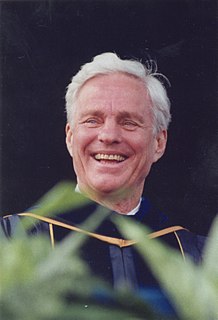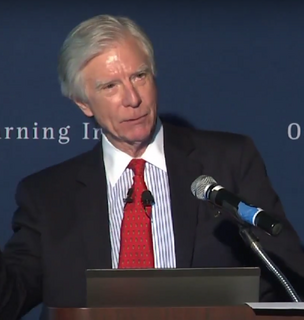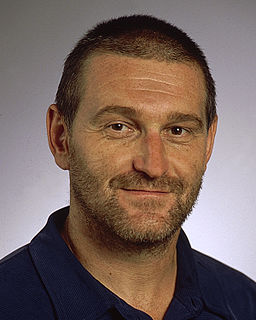
The University of California, San Diego is a public land-grant research university in San Diego, California. Established in 1960 near the pre-existing Scripps Institution of Oceanography, UC San Diego is the southernmost of the ten campuses of the University of California, and offers over 200 undergraduate and graduate degree programs, enrolling 33,343 undergraduate and 9,533 graduate students. The university occupies 2,178 acres (881 ha) near the coast of the Pacific Ocean, with the main campus resting on approximately 1,152 acres (466 ha). UC San Diego is ranked among the best universities in the world by major college and university rankings.
Arend d'Angremond Lijphart is a Dutch-American political scientist specializing in comparative politics, elections and voting systems, democratic institutions, and ethnicity and politics. He is Research Professor Emeritus of Political Science at the University of California, San Diego. He is influential for his work on consociational democracy and his contribution to the new Institutionalism in political science.

Richard Chatham Atkinson is an American professor of psychology and cognitive science and an academic administrator. He is president emeritus of the University of California system, former chancellor of the University of California, San Diego, and former director of the National Science Foundation.

Thurgood Marshall College (Marshall) is one of the seven undergraduate colleges at the University of California, San Diego. The college, named after Thurgood Marshall, the first African-American Supreme Court Justice and lawyer for the landmark 1954 Supreme Court case Brown v. Board of Education, emphasizes "scholarship, social responsibility and the belief that a liberal arts education must include an understanding of [one's] role in society." Marshall College's general education requirements emphasize the culture of community involvement and multiculturalism; accordingly Marshall houses the minors in Public Service and Film Studies for the campus. Significant academic programs and departments have come out of the college over many decades: Communication, Ethnic Studies, Third World Studies, African American Studies, Urban Studies & Planning, and Education Studies.
Robert Carr Dynes is a Canadian-American physicist, researcher, and academic administrator, and professor of physics at the University of California, Berkeley, and the former President of the University of California system, and former Chancellor of the University of California San Diego.
Thomas A. Metzger is a senior fellow at Stanford University's Hoover Institution. He is the son of the German philosopher Arnold Metzger (1892–1974). He specializes in the intellectual and institutional history of China, studying both the premodern and modern periods. His current research focuses on contemporary China's moral-political discourse and its historical roots, dealing with both China and Taiwan. He also has written on U.S.–China policy issues and has lectured widely in English and Chinese in the United States, Europe, Taiwan, China, and Hong Kong.

The University of California San Diego School of Medicine is the graduate medical school of the University of California, San Diego. It was the third medical school in the University of California system, after those established at UCSF and UCLA, and is the only medical school in the San Diego metropolitan area. It is closely affiliated with the medical centers that are part of UC San Diego Health.
Jeffrey Locke Elman was an American psycholinguist and professor of cognitive science at the University of California, San Diego (UCSD). He specialized in the field of neural networks.
California Cultures in Comparative Perspective is a program at the University of California, San Diego in California dedicated to fostering creative and activist interdisciplinary research, teaching, and collaboration among California's communities, faculty, and students. California – in all its dimensions—is the object of its focus.

Peter Hopkinson Smith is a scholar of Latin American history, politics, economics, and diplomacy. He is a distinguished Professor Emeritus of Political Science and the Simon Bolivar Professor of Latin American Studies at University of California in San Diego. He previously served as a professor of history and Department chairman at the University of Wisconsin, Madison, and as professor and dean at the Massachusetts Institute of Technology.

Pavel Arkadevich Pevzner is the Ronald R. Taylor Professor of Computer Science and Director of the NIH Center for Computational Mass Spectrometry at University of California, San Diego. He serves on the Editorial Board of PLoS Computational Biology and he is a member of the Genome Institute of Singapore scientific advisory board.

Keith Rayner was a cognitive psychologist best known for pioneering modern eye-tracking methodology in reading and visual perception.
Mathew Daniel McCubbins was the Ruth F. De Varney Professor of Political Science and Professor of Law, in the Department of Political Science and School of Law at Duke University.

James Richard Arnold was the Harold C. Urey Professor of Chemistry (emeritus), and a noted pioneer in the field of planetary and space chemistry at the University of California at San Diego (UCSD), where an endowed lectureship has been established in his name.

Don W. Cleveland is an American cancer biologist and neurobiologist.
Richard David Kolodner is an American scientist with Ludwig Cancer Research who has made research contributions to the genetic basis for inherited susceptibility to common cancers. He is a Distinguished Professor of Cellular and Molecular Medicine at the UC San Diego School of Medicine. Kolodner is a member of the National Academy of Sciences and National Academy of Medicine, and he is a fellow of the American Academy of Arts and Sciences.
Andrew T. Scull is a British-born sociologist whose research is centered on the social history of medicine, particularly the history of psychiatry. He is a distinguished professor of sociology and science studies at University of California, San Diego, and recipient of the Roy Porter Medal for lifetime contributions to the history of medicine. His books include Madhouse: A Tragic Tale of Megalomania and Modern Medicine and Madness in Civilization: A Cultural History of Insanity.
Clifford P. Kubiak is an American inorganic chemist, currently a Distinguished Professor in Chemistry and Biochemistry and the Harold C. Urey Chair in Chemistry at the University of California, San Diego. Over the course of his career, Kubiak has published over 200 scientific articles. He has also received the American Chemical Society Award in Inorganic Chemistry, and is a Fellow of the American Academy of Arts and Sciences and American Chemical Society. In 2020 he was elected to the National Academy of Sciences.
Stephan Haggard is the Lawrence and Sallye Krause Professor of Korea-Pacific Studies at the School of Global Policy and Strategy and distinguished professor of political scientist specializing in comparative politics at the University of California San Diego. He received his Ph.D. from the University of California Berkeley (1983) and taught in the Government Department at Harvard (1983-1992) before joining the faculty at UC San Diego. He teaches courses on international political economy, the international relations of the Asia-Pacific and qualitative methods. He is currently the editor of the Journal of East Asian Studies, a journal devoted to publishing innovative social science research on the region.
Peter Novick is an American scientist who holds the George Palade Endowed Chair in the Department of Cellular and Molecular Medicine at the University of California, San Diego. His research interests focus on the biology of cell membranes, particularly the secretory pathway and other aspects of membrane trafficking and intracellular transport.